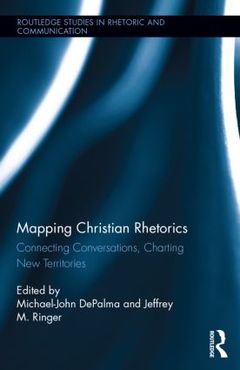Description
Mapping Christian Rhetorics
Connecting Conversations, Charting New Territories
Routledge Studies in Rhetoric and Communication Series
Coordinators: DePalma Michael-John, Ringer Jeffrey M.
Language: English
Subjects for Mapping Christian Rhetorics:
Keywords
rhetorical studies; Christianity; Communciation Studies; Christian rhetorics; composition studies; Religion; Religous; Rhetoric Bildungsroman; Female Preachers; Tract; Rhetorical Theory; Cross-Cultural Rhetorics; Education; Sacred Texts; Rhetorical Methodology; Prayer; Walter Rauschenbusch; Social Gospel; Green Evangelicalism; Young Men; Pentadic Terms; Cartography And Geographic Information Society; Laurent Pernot; Evangelical Christian Students; Vice Versa; Deaconess Movement; Bush Presidential Library; Geographic Information Society; Religious Rhetorics; Violate; Sophistic Rhetoric; Bifurcated Map; Holy Men; Jewish Rhetorics; Christian Students; PMU; Deaconess Work; Constitutive Rhetoric; Jesus’s Parables
· 15.2x22.9 cm · Hardback
Description
/li>Contents
/li>Readership
/li>Biography
/li>
The continued importance of Christian rhetorics in political, social, pedagogical, and civic affairs suggests that such rhetorics not only belong on the map of rhetorical studies, but are indeed essential to the geography of rhetorical studies in the twenty-first century. This collection argues that concerning ourselves with religious rhetorics in general and Christian rhetorics in particular tells us something about rhetoric itself?its boundaries, its characteristics, its functionings. In assembling original research on the intersections of rhetoric and Christianity from prominent and emerging scholars, Mapping Christian Rhetorics seeks to locate religion more centrally within the geography of rhetorical studies in the twenty-first century. It does so by acknowledging work on Christian rhetorics that has been overlooked or ignored; connecting domains of knowledge and research areas pertaining to Christian rhetorics that may remain disconnected or under connected; and charting new avenues of inquiry about Christian rhetorics that might invigorate theory-building, teaching, research, and civic engagement. In dividing the terrain of Christian rhetorics into four categories?theory, education, methodology, and civic engagement?Mapping Christian Rhetorics aims to foster connections among these areas of inquiry and spur future future collaboration between scholars of religious rhetoric in a range of research areas.
Introduction: Current Trends and Future Directions in Christian Rhetorics Michael-John DePalma and Jeffrey M. Ringer Section I: Christianity and Rhetorical Theory 1. Defining Religious Rhetoric: Scope and Consequence Brian Jackson 2. Seeking, Speaking Terra Incognita: Charting the Rhetorics of Prayer William T. FitzGerald 3. The Agentive Play of Bishop Henry Yates Satterlee Richard Benjamin Crosby Section II: Christianity and Rhetorical Education 4. "Where the Wild Things Are": Christian Students in the Figured Worlds of Composition Research Elizabeth Vander Lei 5. Sacred Texts, Secular Classrooms, and the Teaching of Theory Thomas Deans Section III: Christianity and Rhetorical Methodology 6. Coming to (Troubled) Terms: Methodology, Positionality, and the Problem of Defining "Evangelical Christian" Emily Murphy Cope and Jeffrey M. Ringer 7. Empirical Hybridity: A Multimethodological Approach for Studying Religious Rhetorics Heather Thomson-Bunn 8. Evangelical Masculinity in The Pilgrim Boy: A Historical Analysis with Methodological Implications Brenda Glascott Section IV: Christianity and Civic Engagement 9. Mapping the Rhetoric of Intelligent Design: The Agentification of the Scene Matthew T. Althouse, Lawrence J. Prelli, and Floyd D. Anderson 10. "Heaven-touched Lips and Pent-up Voices": The Rhetoric of American Female Preaching Apologia, 1820-1930 Lisa Zimmerelli 11. The Deaconess Identity: An Argument for Professional Churchwomen and Social Christianity Lisa J. Shaver 12. Transforming Decorum: The Sophistic Appeal of Walter Rauschenbusch and the Social Gospel William Duffy Section V: (Re)Mapping Religious Rhetorics 13. More in Heaven and Earth: Complicating the Map and Constituting Identities Beth Daniell 14. Charting Prospects and Possibilities for Scholarship of Religious Rhetorics Michael-John DePalma and Jeffrey M. Ringer
Michael-John DePalma is an Assistant Professor of English in the Professional Writing Program at Baylor University, US.
Jeffrey M. Ringer is an Assistant Professor of English in the division of Rhetoric, Writing, and Linguistics at the University of Tennessee, US.




